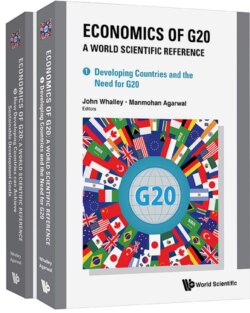Читать книгу Economics of G20 - Группа авторов - Страница 21
На сайте Литреса книга снята с продажи.
Prospects for Cooperation at the G20
ОглавлениеIn contrast to the inter-war period, there are a host of institutions that seek cooperative solutions in their field. We have institutions developing rules and procedures in areas such as banking, insurance and stock exchanges. These rules and procedures bring about greater certainty and uniformity in regulations, which in turn reduces the uncertainties companies face.31 Also, under the aegis of the GATT/WTO, rules for the conduct of trade policy have been agreed upon. These rules have prevented any substantial increase in protection since the crisis unlike in the 1930s. Furthermore, countries have not been compelled to institute restrictive trade measures because of BOP reasons as the IMF can provide BOP financing to countries in need, whereas the absence of any such lender in the inter-war period had also often frozen private BOP financing.
Despite all these institutional innovations, recovery has been very slow. This seems to be that the basic model of economic behaviour on which policy is based is the same as that which had existed in the inter-war years even though ERs are now flexible in many countries rather than being fixed. Central banks are now independent. Furthermore, their mandate in many countries is merely to control the rate of inflation. This is supposed to provide stable expectations that would encourage investment. But the stability that is provided is slanted towards deflation, even though most central banks undertake to target a rate of inflation of 2% with a margin of 2% on either side, i.e. keep inflation between 2% and 4%. But suppose the rate of inflation rises from 1% to 1.5%, there is an immediate clamour to raise interest rates.32 Hence, the expectation is that with the slightest recovery, interest rates will be raised. Thus, monetary policy is biased towards deflation.
Fiscal policy has also been rendered ineffective. It is not supposed to be very effective in tackling short-term fluctuations and is supposed to be geared towards long-term growth. In fact, modern macro is geared towards the long-term and does not really deal with short-term fluctuations. That is why even at the Toronto summit in 2009 there was a strong group of countries arguing that budget deficits should be reined in order to provide a conducive atmosphere for private investment — the same arguments that were made in the 1930s to rein in budget deficits.
Today also there is a shift in the balance of power and no hegemon may exist. But cooperative practices are more deeply entrenched. When the IMF had to raise fresh resources in 2008, China and India agreed to provide them without any quid pro quo. At the time of the 1997 Asian Financial Crisis, there were fears that China may also devalue its currency in order to maintain export competitiveness. But it did not do so. The newer powers have been more cooperative than the US had been then as their economies are much more dependent on the world economy.33
The main role we envisage for the G20 is for leaders to exchange views about how they see their economies evolving. In particular, they can inform their peers how policy in their country is likely to be so that other countries can base their policies on a proper assessment of policies in other countries and would not be faced by surprises. A recovery of the world economy would have to depend on what is the right model of the world economy and what role there is in it for policy.
